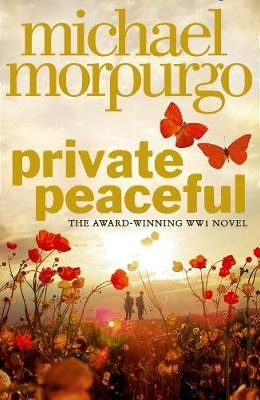
This book is a novel of contrasts: the young and the old; the weak and the fast; the meek and the prideful; the poor and the high class; the countryside with its vast meadows and forests and the dead no man’s land scourged by bombshells; the clean creeks and the trenches with muddy ice cold water; the innocence of childhood and the harsh reality of adulthood; the carefree life during peaceful times and the mind-wrecking experiences of war.
The concept of contrasts goes as far as actually having not one, but two Privates Peaceful as main characters. They are two brothers, Charlie and Thomas, usually called Tommo. Both were born and raised in the British countryside in the beginning of the 20th century. The brothers were born only two years apart, but those two years become an unbridgeable gap for Tommo, the younger of the two, who cannot become as tall, as fast and as strong in spirit as Charlie. He ultimately looses the girl he loves to his older brother. But Tommo does not carry any resentment: “Being his brother I could feel I live in his shadow, but I never have and do not now. I live in his glow.”
Even if Charlie is the one to be considered the lead character because of his charisma, the author had chosen Tommo as the narrator of the brothers’ adventures, accompanied by their elder, mentally challenged brother Big Joe and Molly, the girl who stole both brother´s hearts. The novel is comprised from Tommo’s recollections, written in the dead of the night, since it is the night that will change his life forever.
The novel is written for young adult readers, but it does not follow the usual action packed sequence that is associated with war novels for younger audience. It can be considered rather slow paced, especially in the beginning. The value of the tale lies in the highly detailed descriptions of country life from more than hundred years ago with words of the English language consistent with those times, the words and idioms that are not widely known anymore, especially to those who are not British. The first person point of view gives the reader an opportunity to see a first-hand experience of the tribulations of adolescence, reminisce about being bullied by older kids and arrogant teachers.
The apotheosis of the narration is, of course, the descriptions of the life in the training camp and later at the front lines in France. For Tommo, everything he sees out there is “only hell [he] was living in, a hell on earth, and it was man-made, not God-made”.
Without the gore and endless violence the war action usually portrayed with, the author perfectly delivers the emotional strain of seventeen year old boys during the First World War. The form in which the novel is written gives the reader the impression of getting a glimpse of a journal of a person who really existed because the situations and the language used to describe them are so natural.
“We have to be silent now. Not a whisper, not a word. If the German machine gunners or mortars spot us, and there are places they can, then we’re done for. So we stifle our courses as we slither and slide in the mud, holding onto one another to stop ourselves falling. A line of soldiers passes us coming the other way, dark-eyed men, sullen and weary. No need for questions. No need for answers. The haunted, hunted look in their eyes tells it all.”
Another heartfelt story from the author of “War Horse” for those who wish to get a glimpse of the world long forgotten, the world you will never read about in textbooks.
***
London: HarperCollins Children’s Books, 2004
Check from the e-catalogue ESTER
Olga Ivaškevitš
Väike-Õismäe branch library

